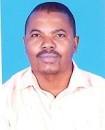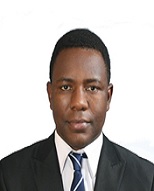Dean, Faculty of Science

Greetings!
I am delighted to welcome you to the webpage of Faculty of Science. This webpage describes the range of our undergraduate and postgraduate programmes and different activities done at Faculty. The Faculty is home to a number of Staff, interns and collaborators whose key function is to leave an indelible ink as they impart knowledge, skills and positive attitude in the students that they teach and supervise in research.
Through three departments named Department of Biological Sciences, Department of Chemistry and Department of Mathematics, Physics and Informatics, we invite all our stakeholders and partners to be part of the Faculty transformative and innovative programs that improve societal wellbeing and industries.
General Information
Historical Background
The Faculty of Science (FoSc) is one of the three Faculties of the Mkwawa University College of Education that were established in 2015/2016. During the College establishment, the Faculty of Science had five Departments; namely Life Sciences, Physics, Chemistry, Mathematics and Informatics. In 2011, the College organisational structure was reviewed and agreed to change academic administrative entities from ‘Departments’ to ‘Units’. Replacement of ‘Department’ by ‘Unit’ was accompanied with merging of some Departments. The reasons for merging of the Departments were shortage of senior academic staff and limited number of students. Merging of the Departments resulted into three Units namely, Physics, Chemistry and Life Sciences, and Mathematics and Informatics. Also, merging of the Departments resulted into four Sections; namely Life Sciences, Chemistry, Informatics and Mathematics. In 2015, another review of Sections and Units was done, separating Chemistry and Life Sciences Unit into two separate Units. Thus, currently the Faculty has three Departments namely; Chemistry, Biological Sciences, and Mathematics, Physics and Informatics.
Academic Programmes Offered
The faculty offers one 3-years Undergraduate degree programme and two years postgraduate programme leading to the following academic qualifications:
- Bachelor of Science with Education (BSc. Ed.)
- Bachelor of Science in Chemistry (BSc. Chem.)
- Master of Science with Education in Chemistry and Biology streams (MSc. Ed.)
- Master of Science in Natural Resources and Human Security Studies (MSc. NRHS)
- Master of Science in Mathematical Modelling (MSc. MM.)
- Master of Science in Applied Zoology (MSc. AZ)
- Master of Science in Applied Botany (MSc AB)
Faculty Graduates
The Faculty’s graduates take on many different career paths. Some aspire to become researchers in education and go to graduate schools. Some become teachers. Others join Diploma teachers training Colleges and some join newspaper, television, or publication companies to pursue careers as education journalists or editors. Some enter private companies and work in internal education- or personnel-related sections. Others become government officials in charge of planning, financing, and managing out educational programs and policies.
Research interests
|
|
Opportunities for the Faculty
The Faculty of Science will successfully achieve the set goals by consideration of the opportunities available. These opportunities are:
- High demand for science teachers in the country.
- Increase in number of public secondary schools.
- Internationalisation.
- International links.
Heads of Departments
| Position | Name | Contacts |
|---|---|---|
| Dean, Faculty of Science | Dr. Talam E. Kibona | talam.enock@muce.ac.tz |
| Head, Department of Biological Sciences | Dr. Olotu L. Moses | olotu.moses@muce.ac.tz |
| Head, Department of Chemistry | Dr. Juma Mmongoyo | juma.mmongoyo@muce.ac.tz |
| Head, Department of Mathematics, Physics, and Informatics | Dr. Jacob I. Irunde | jacob.irunde@muce.ac.tz |
Examinations Officer(s)
| Position | Name | Contacts |
|---|---|---|
| Examinations Officer, FoSc | Dr. Joshua Mwasunda | joshua.mwasunda@muce.ac.tz |
Administrative Officer(s)
| Position | Name | Contacts |
|---|---|---|
| Senior Executive Secretary | Ms. Sauda Mkoroma | sauda.mkoroma@muce.ac.tz |
Department of Biological Sciences
The Department of Biological Sciences is one of the three academic departments in the Faculty of Science at Mkwawa University College of Education (MUCE). The Department is responsible for coordinating, managing and administering the College’s core functions viz., teaching, research and knowledge exchange (consultancy) for achieving MUCE’s envisaged mission and vision. It offers two academic programmes namely, Bachelor of Science with Education (BSc. Ed.) and Master of Science with Education (MSc. Ed.) in Biology Stream.
The Department has a team of experienced experts majoring in various biological fields to include Biodiversity/Conservation Biology, Environmental Sciences, Molecular Biology, Parasitology, Entomology, Botany, Ecology, Bioinformatics, Microbiology, Genetics and other areas in Botany and Zoology in general. Currently, the courses offered in the Department bear the following course codes: BC (Biological Conservation), BL (Biology), BT (Botany), MC (Microbiology) and ZL (Zoology). All courses are detailed in the College Prospectus.
The Department has well equipped modern laboratories intended to facilitate effective and efficient teaching and learning activities. It also has adequately trained personnel who ensure that hands on and supervision of teaching and learning activities are carried out to achieve academic excellence. All these are carried out with high degree of practice oriented knowledge and skills for both undergraduate and postgraduate studies. Students and the wider community are cordially welcome.
Department of Chemistry
The Department of Chemistry at Mkwawa University College of Education is committed to producing high integrity and quality chemistry teachers, and leaders for secondary schools in Tanzania and beyond. The Department offers a myriad of chemistry courses in areas of organic, inorganic, physical and analytical chemistry for undergraduate and master students. Our students enjoy state-of-the-art and rigorous chemistry training both in the lecture rooms and laboratories and we are proud of our outputs as their employability in schools, chemical industries, government authorities etc. has been unparalleled. Chemistry competence in our students via hands-on experiences and problem-solving skills in the laboratories and outside is one of the top priorities of the Department.
Research and Innovation
Research activities available in the Department have so far focused on the following:
- Chemical ecology research for promoting agricultural productivity via developing chemoecological devices to manage pests affecting crops.
- Discovery of useful phytochemicals from medicinal plants-natural product chemistry.
- Fabrication of materials for environmental-clean up and energy generation.
- Sensor technology.
- Functional materials synthesis and characterization.
- Powder technology.
- Nano-filters for water purification.
- Adsorbents
- Exploitation of renewable cashew nut shell oils to synthesize useful chemicals such as detergents, kairomones, polymers etc.
- Environmental chemistry research aimed at analyzing, discovering and remediating potential pollutants.
Seminar Series is available on a semester basis. Each semester the Department runs seminars by academic staff, guest speakers and postgraduate students on Thursdays at 10:00 a.m. Visit our facebook page for more information: "Mkwawa university College of Education"
Department of Mathematics, Physics, and Informatics
This Department belongs to the Faculty of Science and comprises of three subjects, which are: Mathematics, Physics and Informatics. We offer a variety of courses to undergraduate students pursuing Bachelor of Science with Education and Bachelor of Education in Science and we prepare our students to be employed in various sectors of the economy by equipping them with knowledge and skills to perform their duties successfully. Students taking Physics or Informatics as one of the subjects must do research projects in his/her final year of study.
Mathematics
The Mathematics Unit belongs to Faculty of Science and offers courses to undergraduate students pursuing Bachelor of Science with Education and Bachelor of Education in Science where one of the major subjects must be Mathematics. We offer courses in Applied Mathematics, Pure Mathematics and Mathematical Statistics. The courses that we offer includes Ordinary Differential Equations, Linear Algebra, Foundations of Analysis, Functions of Single Variable, Functions of Several Variables, Mathematical Statistics, Linear Programming , Rigid Body Mechanics, Complex Analysis, Abstract Algebra and Functional Analysis. We have sufficient number of Lecturers and Assistant Lecturers specialized in various fields who run different courses of Mathematics. We prepare our students to be teachers, researchers and leaders. Our students can also be employed into various sectors of the economy in both private and public companies after their graduation.
Physics
The Physics Unit offers Physics Courses to Undergraduate Students who pursue Bachelor of Science with Education [B.Sc (Ed)] and Bachelor of Education in Science [B.Ed (Sc)]. The undergraduate major in Physics leading to the B.Sc (Ed) or B.Ed(Sc) provides for a mastery of Basic Principles and Methods of Classical and Modern Physics and prepares the student for a wide variety of career opportunities. A degree in Physics can lead to a challenging and interesting career. Physics as a profession has always been at the center of exciting discoveries, and much of modern science is originally based on the research done by Physicists. The Physics Department (MUCE) encourages students who are enrolled at MUCE Faculty of Science to major Physics Subjects. Physics Courses at MUCE provide theoretical, practical and projects skills. Employment opportunities in Physics are varied and abundant, from Industrial research and development to teaching. Physicists are employed in all sectors of society, including corporations, government research agencies and universities. Physicists are presently enjoying unusual opportunities in the development of new concepts that are expected to have far-reaching consequences in the high technology of the future. Totally new applications are arising from understanding basic physics principles. Some of these emerging technologies include laser communications, holography, synchrotron radiation light sources, opto-electronics, high temperature superconductors and physic applications in medicine. At a time when technological developments and discoveries are creating a heavy demand for Physicists, projections indicate the possibility of a critical shortage of trained Physicists.
Informatics Unit
The Informatics Unit belongs to Faculty of Science and offers courses to undergraduate students pursuing Bachelor of Science with Education where one of the major subjects must be Informatics. We offer courses in Databases, programming, and Networking. The courses that we offer include Data Structures and Programming, Operating Systems, Basic Computer Applications, Network Design and Administration, Software Development, Introduction to High-level Programming, Object-Oriented Programming, System Analysis and Designing, and Implementation of Databases. The courses offered by the department cover both theoretical and practical aspects that prepare students to be ICT-teachers as well as experts once graduated. Furthermore, the unit administers a research project for final year students that stands as a measure of student’s competence upon knowledge acquired in the entire period of study. We have enough Lecturers and Assistant Lecturers specialized in various fields that can groom students to be teachers, researchers and leaders.
Facts
Fact 1
(MUCE) is named after the legendary Chief Mkwawa, who was a prominent historical figure in Tanzania. Chief Mkwawa played a significant role in the resistance against German colonial rule in the late 19th century.
Fact 2
MUCE is known for its intriguing underground tunnels. These tunnels are remnants of the German colonial era and were primarily used as a means of transportation and escape during times of conflict.
Fact 3
MUCE boasts a picturesque campus with lush greenery and beautiful scenery. For many years the College has won the award for having clean and conducive environments
Statistics
Degree Programmes
Masters Programmes
Short Courses
Staff at the Directorate of Undergraduate Studies



Photo Gallery

Mahafali ya 50 ya Chuo Kikuu Kishiriki cha Elimu Mkwawa

Wanafunzi bora wa Chuo waliofungana matokeo.

Wanafunzi bora wa Chuo waliofungana matokeo.

Wanafunzi bora wa Chuo waliofungana matokeo.

Wanafunzi bora wa Chuo waliofungana matokeo.

Wanafunzi bora wa Chuo waliofungana matokeo.
